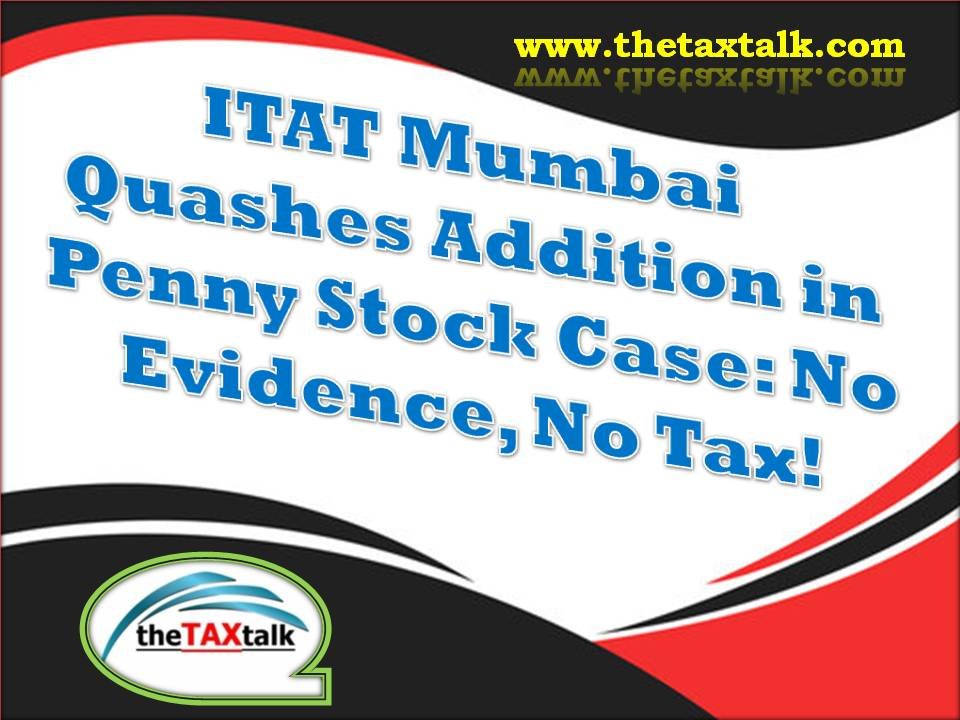![]()
ITAT Mumbai Quashes Addition in Penny Stock Case: No Evidence, No Tax!
In a significant victory for honest investors, the Income Tax Appellate Tribunal (ITAT), Mumbai has delivered a judgment that could bring relief to many taxpayers facing additions under section 68 and 69C in alleged penny stock cases. In the case of Ms. Sangeeta Kalpesh Chawalla vs. ITO, ITA No. 458/Mum/2025 (A.Y. 2012-13), the Tribunal has held that additions made purely on suspicion, without any direct evidence of manipulation or rigging by the assessee, are unsustainable in law.
The Background: Penny Stocks and STCL
Ms. Chawalla filed her return for AY 2012–13 declaring a modest income of ₹2,52,390. However, the trouble began when information from the Kolkata Investigation Wing flagged her transactions in shares of M/s. Regency Trust Limited (Scrip Code: 511585), suspected of being used for bogus Long-Term Capital Gains (LTCG) and Short-Term Capital Loss (STCL).
Key Share Transaction Details:
Purchase: ₹1.06 crore+
Sale: ₹28.27 lakh
Claimed STCL: ₹1.70 lakh (on sale of 45,513 shares)
The Assessing Officer (AO) reopened the case under section 147 and added ₹28.27 lakh as unexplained cash credit under section 68, along with a 2% commission disallowance of ₹56,546 under section 69C—on the assumption that the gains were mere entries in a penny stock scam.
Tribunal’s Key Observations: Assumption ≠ Evidence
The Tribunal, led by Hon’ble Judicial Member Shri Narender Kumar Choudhry, sharply criticized the Revenue authorities for relying on assumptions without any concrete evidence against the assessee. The key takeaways from the judgment include:
No Allegation of Direct Involvement
Neither the AO nor the CIT(A) had made any specific allegation or finding that Ms. Chawalla was involved in rigging the share prices or was linked to any operators of the scrip.
Genuine Documentation Was Ignored
The AO acknowledged that the assessee submitted:
Share purchase and sale details
Computation of income
Broker confirmations and Demat account statements
However, without finding any flaw in these documents, the AO presumed wrongdoing merely based on a general alert from the Kolkata Investigation Wing.
Reliance on Jurisdictional High Court Precedents
The Tribunal cited the Bombay High Court ruling in Indravadan Jain HUF, where additions were deleted in similar circumstances, even when SEBI had found irregularities in the scrip, but the assessee’s own transactions were well-documented and above board.
Similar Case with Same Scrip: Shah Sandeep Anantkumar HUF
Interestingly, the Tribunal noted that an identical case involving the same scrip-Regency Trust Ltd.-had already been decided in favour of the taxpayer by the same bench (ITA No. 4628/Mum/2023). In that case too:
Transactions were done via SEBI-registered brokers
No cash trail or unaccounted money was found
No evidence linked the taxpayer with price manipulation
Hence, the addition under section 68 was deleted, and the logic applied in that case was extended to Ms. Chawalla’s case as well.
Why This Order Matters
This order reiterates a core principle of tax jurisprudence: suspicion, no matter how strong, cannot replace evidence. Mere involvement in a flagged scrip, in absence of concrete evidence of manipulation or unaccounted funds, cannot justify taxing bonafide transactions.
Practical Implications for Taxpayers and Professionals
1. Proper Documentation Is Critical
Always maintain broker contract notes, Demat statements, payment proofs, and delivery instructions.
2. Rebut Presumptions With Facts
If faced with allegations of penny stock rigging, demonstrate the transaction trail with clarity.
3. Cite Judicial Precedents
Decisions like Indravadan Jain HUF and Shah Sandeep Anantkumar HUF can be potent tools in appellate proceedings.
4. Watch for NFAC Orders Without Hearing
In this case, CIT(A) passed an ex parte order without giving the assessee a chance to be heard. Such procedural lapses are grounds for setting aside adverse orders.
Final Verdict
The Tribunal allowed Ms. Chawalla’s appeal, deleted the addition of ₹28.27 lakh under section 68 and ₹56,546 under section 69C, and gave her a clean chit.
“Additions under consideration are unsustainable in the eyes of law.” – ITAT Mumbai
The copy of the order is as under:


